Trump executive order: Victims of US entry ban tell their stories
- Published
US-Syrian clarinetist Kinan Azmeh - touring in Beirut - is worried he may not be allowed back
President Donald Trump's order , externalsuspending immigration from seven Muslim-majority countries for 90 days has left many foreigners in limbo. Here are some of their experiences:
'We are not even eating'
Fauzia Mohamud, from war-torn Somalia, has been a refugee for 27 years. She applied to resettle in the US, and her application took three years to process. She was due to travel there from Nairobi in a few months' time.
She told the BBC: "The ban has affected us so much. We are so worried that we are not even eating. We don't know what to do. It has crushed all our hopes. It has changed our lives. We have been here for 27 years. Our country is not safe, so we thought we would get safety and security in the US."
"US has rejected me but I can't return to Somalia"
Fatuma Hassan was born in Dadaab refugee camp, in Kenya. She is 18 and waiting to be sent to the orientation centre to be flown to America.
"The US has rejected me," she said. "And I was hoping to get a good education and a better future. Here in Kenya I'm not getting any of that, and I can't go back to Somalia. I am very worried.
"Today I was told that some friends from Dadaab who are at the orientation centre have been sent back to the camp in buses. Others will be sent tomorrow. This has really crushed our hopes and we don't know what to do. We can't go back to our country."

'We have no bad intentions'
American David Basch spoke to the BBC from Ankara, Turkey. He had travelled there with his wife Fatemeh, an Iranian citizen, who was due to attend an immigration interview at the US embassy on 31 January.
That interview was abruptly cancelled on Sunday.
"We physically went to the embassy," Mr Basch said. "I tried, being a US citizen. I was declined access because I did not have an appointment."
Mr and Mrs Basch met and married in Pune, India, but had planned to move to Florida, where they have a second home. They have been waiting a year, since filing the legal documents required to get Fatemeh an immigrant visa.
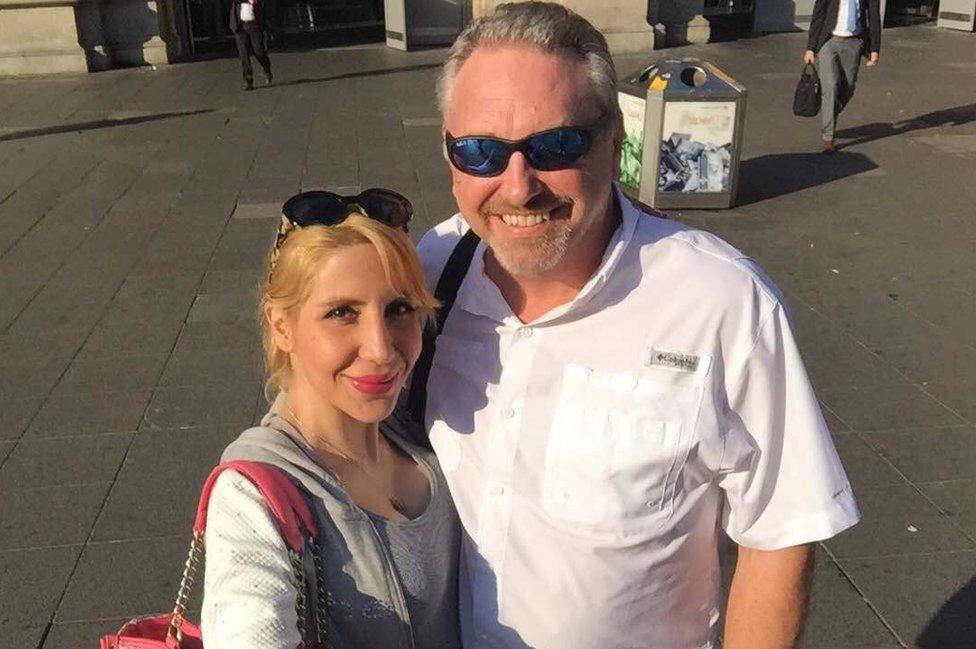
David Basch and his wife Fatemeh have a second home in Florida, but no way of getting there
Their plans have been cast into uncertainty. Mrs Basch was in India on a student visa, but has completed her masters' degree. The couple had already agreed to give up their apartment in Pune.
"As a US-born citizen I am shocked and embarrassed by the recent Executive Order from President Trump," Mr Basch said. "We will happily go through all required vetting as we have nothing to hide, and have no bad intentions for anyone in the US or any other country."
As Iran has banned US citizens from entering the country in retaliation for President Trump's move, the couple cannot go there together. In any case, Fatemeh fears she would be persecuted for being a Muslim-born woman married to a nominally Catholic American - even though neither of them now follows a religion.
"We know we can't make it [to the US] for probably 90 days. We're looking for a country that will allow us to wait for three to six months," Mr Basch said.
"This is a sad day for what I have always considered to be a great country."

'It's heartbreaking and frustrating'
One Green Card holder who requested anonymity told the BBC that her Iranian mother, 69, was scheduled to fly to the US on Sunday morning.
"She applied in about May last year - 2016. That was two months after I gave birth to my son. She was hoping to come and visit us in the US and see her grandson for the first time. She finally got her visa clearance, after nine months of waiting, two weeks ago.
"We have a ticket for tomorrow morning - she was planning to fly [...] in the morning and land in New York the same afternoon. We still don't know, but I have seen all the other people who were returned already from the same border, and I called the US patrol - the US border and they said that they would be returned from JFK."
The 33-year-old, who has a Masters' degree in engineering and arrived in the US a decade ago, fears the crackdown will have long-term ramifications.
"My husband is American, and his whole family is here. I was bringing up the fact, 'Are you even open to leave this country? Is this a country where I would like to live? It's a country that is departing from its values. I don't think this is American. I don't think it's human - it's not ethical!
"But at the same time, my family is American. I cannot ask my husband to leave with me and pack the baggage any time that we are facing these difficult moments. So, what I'm thinking is that maybe he can take my son to a different country... so that my mum would be able to see her grandson at least once."

Chaos over transit flights
Travellers who need to catch onward flights in the US are also having their plans upended.
Hamaseh Tayari, a vet from the University of Glasgow, told the BBC she was "really upset" and "afraid" after being denied permission to fly home from Costa Rica via New York.
Dr Tayari, who holds Iranian nationality, had been due to return to Scotland on Saturday after a two-week holiday.
Speaking from San Jose airport in Costa Rica, Dr Tayari said: "We arrived at the airport this morning at five o'clock for the check-in to fly to New York, and then from New York to Glasgow. The people at the check-in told me that I was not allowed to take the plane because of the new rules.
"[...] The only thing that I've found is a direct flight from San Jose to Madrid."
New flights back to Glasgow via Madrid were set to cost her and her boyfriend almost £2600 ($3,260).
"We've spent all our money for the next months," she told the BBC. "I don't know how we [will] afford to pay the rent, the bills, and the food..."
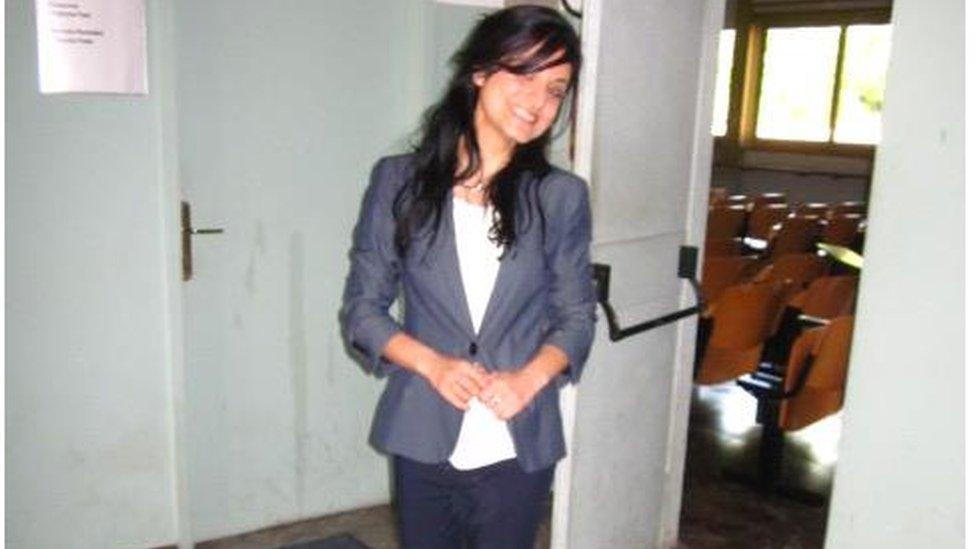
Hamaseh Tayari holds an Iranian passport but lives and works in Scotland
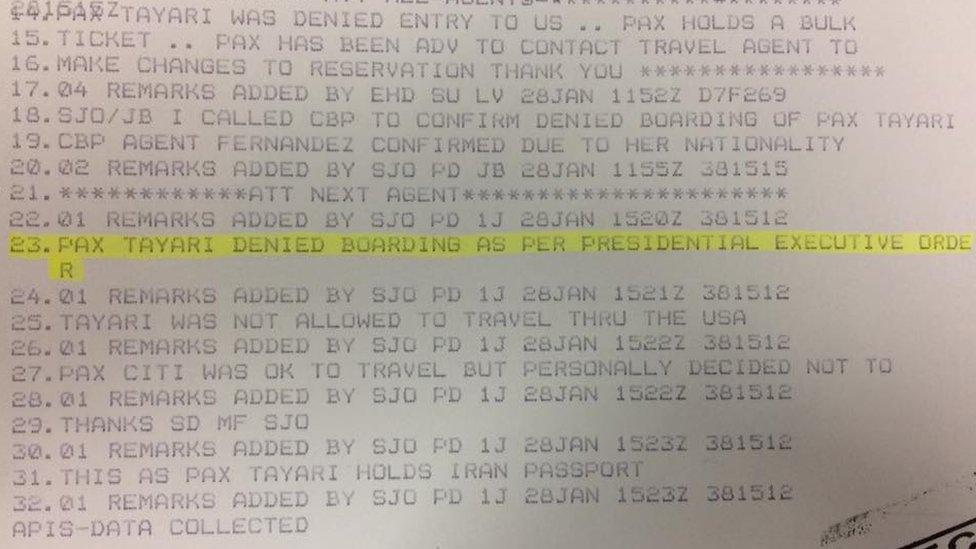
United Airlines told Hamaseh Tayari she had been prevented from travelling
A few hours after she spoke to BBC Radio Scotland, a crowd-funding appeal launched by Women for Independence raised £6,175 to get Dr Tayari and her boyfriend home.
The emotional vet described the appeal as "amazing".
The remainder of the money will be donated to the Scottish Refugee Council.

'This ban is so demeaning'
Batool Shannan, a Syrian in Essen, Germany, was due to travel to the US in a week's time.
She is a scientist working in skin cancer research, and has previously worked in America.
"I'm a Syrian who left Syria in 2012 to work in Philadelphia for two and a half years," she told the BBC. "I then moved to Germany, where I have been ever since.
"I applied and got a B1/B2 [visitor's] visa and was going to Philadelphia on 8 February for a vacation and to visit my old colleagues. I'm a scientist and work on melanoma research, and collaborations are so important. Now, not only am I banned from going - I'm not sure I can cancel my flights [the trip cost around 1,000 Euros ($1,069 / £852) - flights and visa].
"The feeling of injustice is so big, and this ban is so demeaning! Shame!"
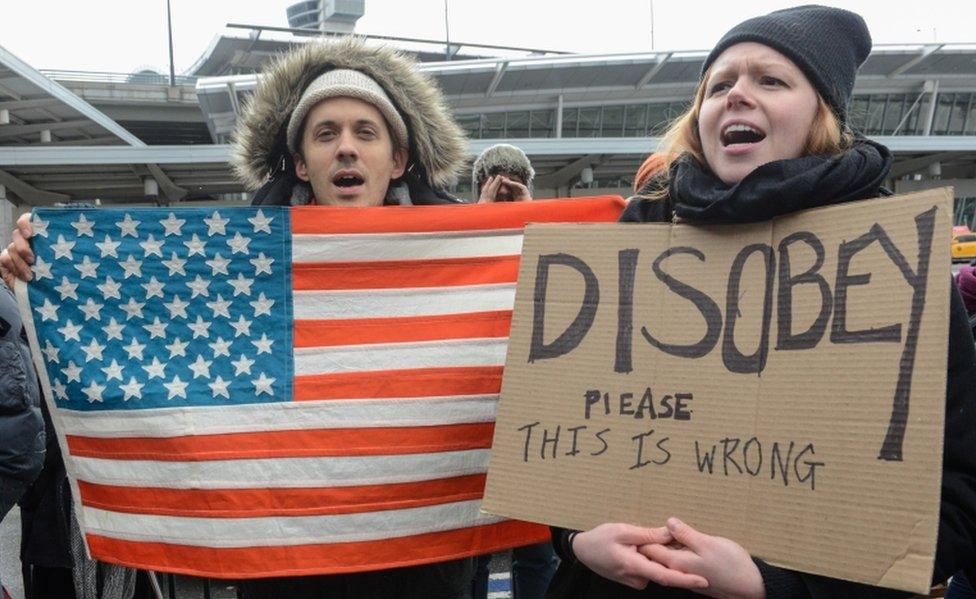
The ban is affecting foreigners with US visas or green cards who are currently abroad

A transgender Iraqi woman says her dreams have been "shattered" by the president's order

'Dreams shattered by the stroke of a pen'
Musa Sharkawi, a cardiology fellow from Jordan, is training in Connecticut and was recently joined by his wife - a Syrian doctor.
"As a Syrian passport holder, she cannot leave the country as she would not be permitted to return," he said.
"Her family cannot visit us as they have been banned from obtaining American visas. The new executive order is literally ripping families apart and worse.
"Many dreams have been shattered by the stroke of the pen of the new president. Many young bright doctors have spent years preparing for and taking licensing exams that have cost thousands of dollars.
"I was the chief resident at the hospital where I did my training, and treated thousands of patients. I have published numerous research papers and books chapters. I have taught and trained hundreds of medical students and junior doctors, both American and foreign.
"This is a dramatic change in attitude and one that will dissuade a lot of bright young minds from pursuing the American dream."
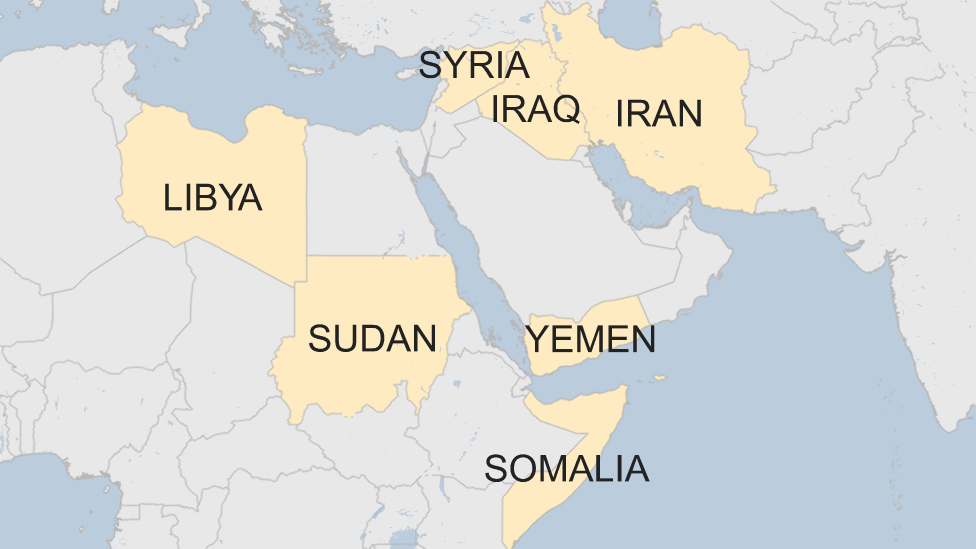

'I thought a Green Card was permanent'
Some of those affected by the entry restrictions are already considering a permanent move away from the US.
One Iranian professional working in the Washington DC area told the BBC his wife had gone back to Iran while she waited for her visa to be renewed. The process took five months, and now she is trapped overseas.
"I have been hearing some shocking stories. Even people with Green Cards are not being allowed into the US. I thought the Green Card was called a permanent residency - but apparently it's not so permanent!"
He says that joining his wife back in Iran is one option - but otherwise the pair will take their experience of living abroad, and try to resettle.
"We may try our chances with other countries [...] Maybe Canada or Australia. We'll see if we can transfer and start over."

My visa is "not enough"
Iraqi Fuad Suleman, who was turned back in Cairo, says he and his family had been preparing to emigrate to the US for two years
Fuad Suleman, an Iraqi national, was granted a valid visa to move to the US with his family. He says he worked on projects funded by US organizations in the years following the 2003 U.S.-led invasion of Iraq, so when security conditions in Iraq deteriorated he applied via the Special Immigrant Visa programme, which has been created to assist thousands of Iraqis who helped the Americans. But the Sulemans were turned back when they tried to board a connecting flight from Cairo.